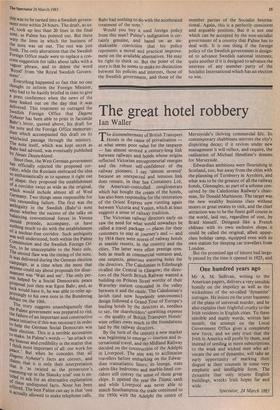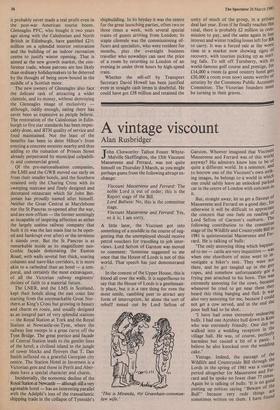The great hotel robbery
Ian Waller
The dismemberment of British Transport Hotels in the cause of privatisation — at what seems poor value for the taxpayer — has almost severed a century-long link between railways and hotels whose origins reflected Victorian entrepreneurial energies and the robust self-confidence of the railway pioneers. I say 'almost severed' because an unexpected and tenuous link does remain, in that Sea Containers Ltd, the American-controlled conglomerate which has bought the cream of the hotels, has also been responsible for the restoration of the Orient Express now running again between Victoria and Venice, which at least suggests a sense of railway tradition.
The Victorian railway directors early on saw the need for what would nowadays be called a travel package — places for their customers to stay at journey's end — and by 1914 there were scores of railway hotels at seaside resorts, in the country and the cities. The latter were often prestige sym- bols as much as commercial ventures and, one suspects, generous watering holes for the directors. The Caledonian in Edinburgh rivalled the Central in Glasgow; the direc- tors of the North British Railway wanted a building on Princes Street worthy of their Waverley station concealed in the valley between it and the castle. The Caledonian's lavish (and now hopelessly uneconomic) design followed a Grand Tour of Europe's leading hotels by the directors at, needless to say, the shareholders' unwitting expense — the quality of British Transport Hotels' wine cellars owes much to the foundations laid by the railway directors.
By the turn of the century a new market was beginning to emerge — tourism and in- ternational travel, and the Midland Railway decided on the construction of the Adelphi in Liverpool. The aim was to acclimatise travellers before embarking on the Edwar- dian transatlantic liners; its lounge, state cabin-like bedrooms and marble-lined cor- ridors still convey the sense of those great ships. It opened the year the Titanic sank and while Liverpool was never able to match Southampton the trade continued to the 1950s with the Adelphi the centre of
Merseyside's thriving commercial life. Its contemporary shabbiness mirrors the city's dispiriting decay; if it revives under new management it will reflect, and require, the realisation of Michael Heseltine's dreams for Merseyside.
Edwardian ambitions were flourishing in Scotland, too, but away from the cities with the planning of Turnberry in Ayrshire, and what was to be the greatest of all the railway hotels, Gleneagles, as part of a scheme con- ceived by the Caledonian Railway's chair- man, Sir Donald Mathieson. The target was the new wealthy business class without moors or great estates to visit, and the chief attraction was to be the finest golf course in the world, laid out, regardless of cost, by Braid himself. Designed like a French château with its own exclusive shops it could be called the original, albeit upper- class holiday camp, equipped even with its own station for sleeping car travellers from London.
But the promised age of leisure had large- ly passed by the time it opened in 1925, and it probably never made a real profit even in the post-war American tourist boom. Gleneagles PFC, who bought it two years ago along with the Caledonian and North British in Edinburgh, have gambled £21/2 million on a splendid interior restoration and the building of an indoor recreation centre to justify winter opening. That is aimed at the new growth market, the con- ference trade, whose patrons are less likely than ordinary holidaymakers to be deterred by the thought of being snow-bound in the middle of a Scottish moor.
The new owners of Gleneagles also face the delicate task of attracting a wider clientele, and its money, without destroying the Gleneagles image of exclusivity although, oddly enough, eating there has never been as expensive as people believe. The restoration of the Caledonian in Edin- burgh to five star standards has been impec- cably done, and BTH quality of service and food maintained. Not the least of the benefits has been to deter Hilton's from erecting a concrete monster nearby and thus adding to the ruination of Princes Street already perpetrated by municipal culpabili- ty and commercial greed.
Of the pre-nationalisation companies, the LMS and the GWR moved out early on from their smaller hotels, and the Southern retained only the Charing Cross with its sweeping staircase and finely designed and decorated restaurant which Sir John Bet- jeman has proudly named after himself. Neither the Great Central at Marylebone nor the St Pancras re-opened after the war, and are now offices — the former seemingly as incapable of inspiring affection as either the largely useless railway company that built it (it was the last main line to be open- ed and bankrupt ever after) or the terminus it stands over. But the St Pancras is as remarkable inside as its magnificent neo- Gothic facade dominating the Euston Road; with walls several feet thick, soaring columns and nave-like corridors, it is more akin to a cathedral than an hotel — a tem- poral, and certainly the most extravagant, of all the Victorian railway engineers' shrines of faith to a material future.
The LNER, and the LMS in Scotland, kept their hotels along the east coast line starting from the unremarkable Great Nor- thern at King's Cross but growing in beauty and charm en route, and usually designed as an integral part of very splendid stations — the Royal Station at York and the Royal Station at Newcastle-on-Tyne, where the railway line sweeps in a great Curve off the Tyne Bridge. The great portico and façade of Central Station leads to the gentler lines of the hotel; a civilised island in the jungle of tower blocks and flyovers that T. Dan Smith inflicted on a graceful Georgian city centre. The Station Hotel in Inverness is a Victorian gem and those in Perth and Aber- deen have a special character and charm.
Incidentally, the economic decline of the Royal Station at Newcastle — although still a very agreeable hotel — has an interesting parallel with the Adelphi's loss of the transatlantic shipping trade in the collapse of Tyneside's 'shipbuilding. In its heyday it was the centre for the great launching parties, often two or three times a week, with several special trains of guests arriving from London; its staple clientele was the commissioning of- ficers and specialists, who were resident for months, plus the overnight business traveller who nowadays can save the price of a room by returning to London of an evening in under three hours by high-speed train.
Whether the sell-off by Transport Secretary David Howell has been justified even in straight cash terms is doubtful. He could have got £38 million and retained the
unity of much of the group, in a private deal last year. Even if he finally reaches this total, there is probably £2 million in com- mission to pay, and the same again in lost interest and winter trading losses left for BR to carry. It was a forced sale at the worst time in a market now showing signs of recovery, with tourism picking up as sterl- ing falls. To sell off Turnberry, with its world-famous golf course and prestige, for £14,000 a room (a good country hotel gets £30,000 a room even now) seems worthy of scrutiny by the.Commons Public Accounts Committee. The Victorian founders must be turning in their graves.















































 Previous page
Previous page